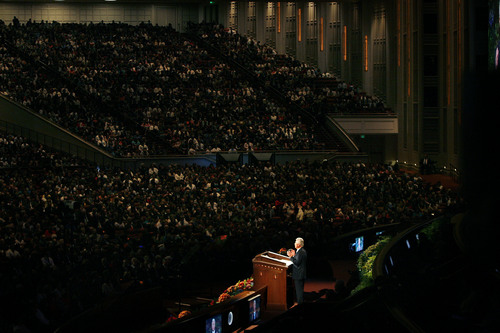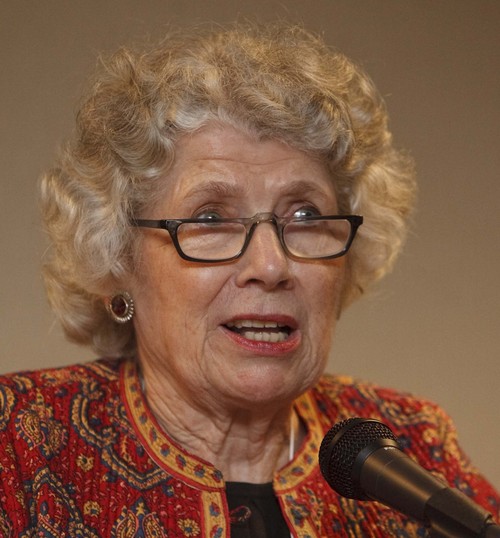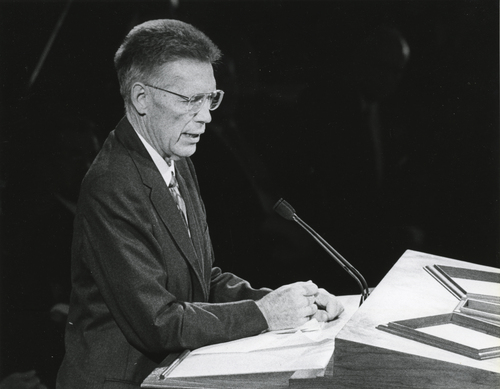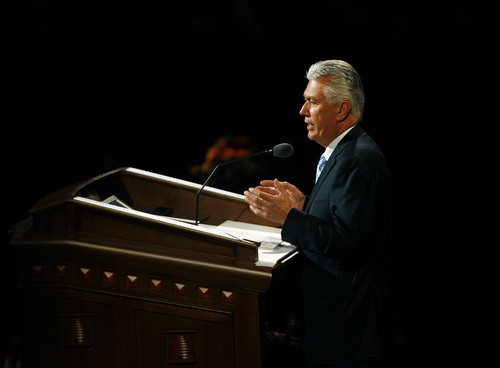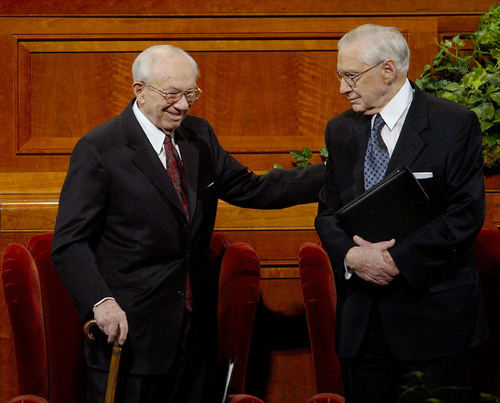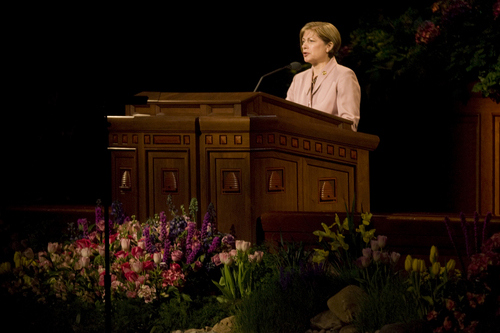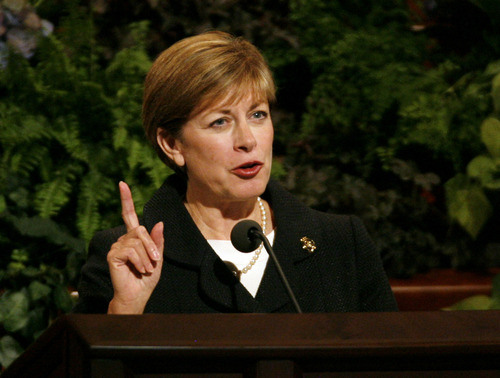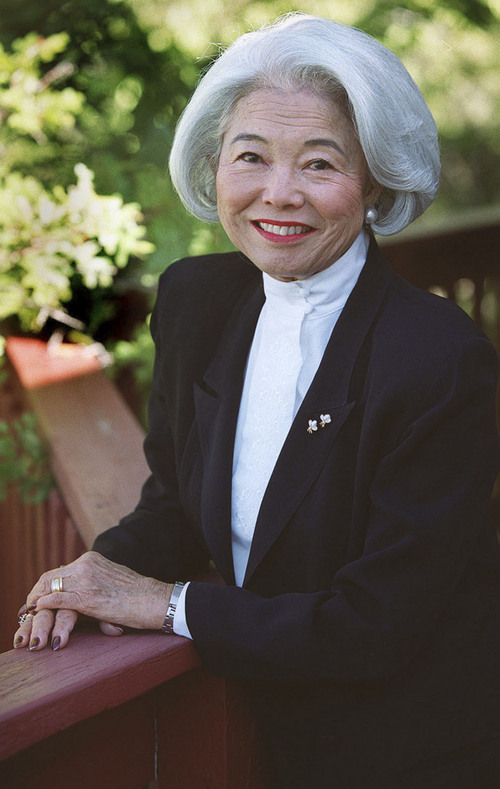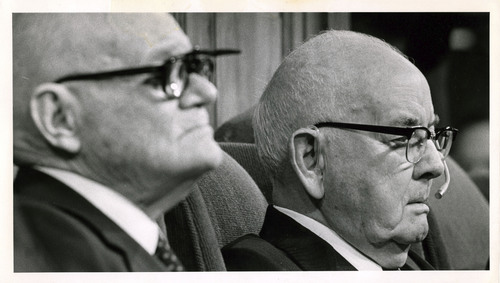This is an archived article that was published on sltrib.com in 2014, and information in the article may be outdated. It is provided only for personal research purposes and may not be reprinted.
Mormons listen to dozens of talks by dozens of LDS leaders every six months in General Conference.
Sometimes the messages seem to blur together. Sometimes they are heard and quickly forgotten. Sometimes they inspire for the moment before fading into the hazy haunts of memory. But sometimes they stick forever in the minds of members, milestone markers on their paths of faith.
We asked several Latter-day Saints to recall their favorite conference sermons and why those words still endure.
Melissa Wei-Tsing Inouye, a lecturer in Asian studies at the University of Auckland, who previously taught at the University of Hong Kong
I remember LDS Church President Gordon B. Hinckley's April 2004 talk — "The Dawning of a Brighter Day" — as a time when I felt in my heart that the prophet had spoken in the way that prophets usually speak: not by predicting the future, but by calling people to repentance.
It was hard for me to hear his recital of the poverty, disease, hatred and brutal inhumanity that filled the world without feeling inclined to despair. One potential response to this dark picture would be to conclude, "Well, the world is going to hell in a handbasket, so let it go! At least we Latter-day Saints will be saved!"
And yet with his characteristic optimism and energy, President Hinckley called on us to put aside our tendency to insularity and judgment and to engage with the world in a spirit of humility and compassion.
"[Our status as Latter-day Saints] does not put us in a position of superiority. Rather, it should humble us," he said. "It places upon us an unforgiving responsibility to reach out with concern for all others in the Spirit of the Master, who taught, 'Thou shalt love thy neighbour as thyself' (Matt. 19:19). We must cast out self-righteousness and rise above petty self-interest. .…
"It is not enough to simply be known as a member of this church. A solemn obligation rests upon us. Let us face it and work at it. We must live as true followers of the Christ, with charity toward all, returning good for evil, teaching by example the ways of the Lord, and accomplishing the vast service he has outlined for us."
I also liked the fall 2011 talk — "What I Hope My Granddaughters (and Grandsons) Will Understand About Relief Society" — by women's Relief Society President Julie B. Beck in the General Relief Society meeting.
"Every day, Relief Society sisters around the world experience the entire range of mortal challenges and experiences. Women and their families today live face to face with unrealized expectations; mental, physical and spiritual illness; accidents; and death," Beck said. "Some sisters suffer loneliness and disappointment because they do not have families of their own, and others suffer from the consequences of poor choices made by family members. Some have experienced war or hunger or natural disasters, and others are learning about the strain of addictions, unemployment or insufficient education and training. All of these difficulties have the potential to bleach the bones of faith and exhaust the strength of individuals and families. One of the Lord's purposes in organizing the sisters into a discipleship was to provide relief that would lift them above 'all that hinders the joy and progress of woman.' In every ward and branch, there is a Relief Society with sisters who can seek and receive revelation and counsel with priesthood leaders to strengthen each other and work on solutions that are applicable in their own homes and communities."
I was in Hong Kong when I heard this talk. I liked it because President Beck had clearly chosen her words with care to speak to everyone in a global audience of LDS women from all walks of life.
Generally speaking, the everyday challenges faced by speakers and members of the audience in the Conference Center pale in comparison to those of Latter-day Saints living in countries torn by war or stricken by deep poverty.
The great virtue of President Beck's talk was that her topic, the enduring strength and inspiration to be found in a community of sisters, was something to which all of the women in the audience at the Wanchai chapel in Hong Kong could relate. This was an impressive feat because this audience was composed of two groups of women who in some ways could not be more different.
The vast majority were domestic helpers, most of them from the Philippines but some from Indonesia and other countries. They had come to Hong Kong on multiyear contracts to work as live-in maids in charge of cleaning, cooking meals, and taking care of children, elderly family members and pets. Many of these sisters were routinely physically abused by their employers or subjected to unfair employment contracts that trapped them in debt. All of them worked long hours and were separated for years at a time from the husbands, children and extended family members whom they worked to support.
The other group of women (a group that included me) was composed of Western expatriates, scattered in ones and twos throughout the chapel. Most of us had come from wealthy nations such as the United States and Australia so that our husbands could pursue lucrative career opportunities in law, finance and international corporate management. We dealt with "first world" problems like how to get our children into the best kindergartens and schools.
Again, this is not to say that finding suitable schooling for one's children is not an important parental responsibility. But the problems of most of my Western expatriate sisters and I were on a different scale compared to the problems of our Filipina sisters and, for that matter, hundreds of thousands of other LDS women in other countries who were also listening to this talk.
As I listened to this session, I was struck by the stark differences between the experiences and perspectives of LDS women around the world. And yet I also saw that in this moment, we were unified by our purposeful assembly together and by President Beck's powerful vision. Awareness of these differences brought humility, and this humility allowed the Spirit to testify.
—
Claudia Bushman, American historian, co-author of "Mormons in America," and founding editor of Exponent II, a magazine for and about LDS women
I'll take anything by Relief Society counselor Chieko N. Okazaki with her spirit of unity and inclusion and her visual aids, particularly "Baskets and Bottles" from April 1996. I love her theme that we are all alike and equal — "bond and free, male and female," something to hang onto despite occasional evidence to the contrary. She was truly the greatest LDS orator of her age.
"The doctrines of the gospel are indispensable. They are essential, but the packaging is optional," she said. "Let me share a simple example to show the difference between the doctrines of the church and the cultural packaging. Here is a bottle of Utah peaches, prepared by a Utah homemaker to feed her family during a snowy season. Hawaiian homemakers don't bottle fruit. They pick enough fruit for a few days and store it in baskets like this for their families. This basket contains a mango, bananas, a pineapple and a papaya. I bought these fruits in a supermarket in Salt Lake City, but they might have been picked by a Polynesian homemaker to feed her family in a climate where fruit ripens all year round.
"The basket and the bottle are different containers, but the content is the same: fruit for a family. Is the bottle right and the basket wrong? No, they are both right. They are containers appropriate to the culture and the needs of the people. And they are both appropriate for the content they carry, which is the fruit.
"Now, what is the fruit? Paul tells us: 'The fruit of the Spirit is love, joy, peace, long-suffering, gentleness, goodness, faith, meekness [and] temperance.' "
—
Adam S. Miller, philosophy professor at Collin College in McKinney, Texas, and author of "Letters to a Young Mormon"
I didn't know Elder F. Enzio Busche of the Seventy but, from a distance, he always struck me as the model for a relatively rare but vital thing: a Mormon mystic. His October 1993 General Conference address, "Truth Is the Issue," shows him in this light.
Here, Elder Busche urges us to see that saving truths are neither objects in the world nor hunches about heaven. Rather, a saving truth arises from being exposed, without excuse or defense, to the truth about ourselves. It arises from an exposure to both our irreparable nothingness and that stainless divine nature that, regardless, beats on in our breasts like God's own heart. This is where the fire burns.
Elder Busche urges us to constant prayer and he promises that "in the depth of such a prayer, we may finally be led to that lonesome place where we suddenly see ourselves naked in all soberness. Gone are all the little lies of self-defense. We see ourselves in our vanities and false hopes for carnal security. We are shocked to see our many deficiencies, our lack of gratitude for the smallest things. We are now at that sacred place that seemingly only a few have courage to enter, because this is that horrible place of unquenchable pain in fire and burning. This is that place where true repentance is born. This is that place where the conversion and the rebirth of the soul are happening."
Go there.
—
Thomas G. Alexander, an emeritus faculty member from Brigham Young University, author of several books and president-elect of the Sons of Utah Pioneers.
My favorite recent talk was the one by President Dieter F. Uchtdorf in October 2013 called "Come, Join With Us." It contained the following about Mormons who leave the faith they once loved:
"Sometimes we assume it is because they have been offended, or lazy or sinful. Actually, it is not that simple. In fact, there is not just one reason that applies to the variety of situations. Some of our dear members struggle for years with the question of whether they should separate themselves from the church. In this church that honors personal agency so strongly, that was restored by a young man that had questions and sought answers, we respect those who honestly search for truth."
President Uchtdorf also addressed the faith questions that confront members.
"Some struggle with unanswered questions about things that have been done or said in the past," he said. "We openly acknowledge that in nearly 200 years of church history — along with an uninterrupted line of inspired, honorable and divine events — there have been some things said and done that could cause people to question. …
"And to be perfectly frank, there have been times when members or leaders in the church have simply made mistakes. There may have been things said or done that were not in harmony with our values, principles or doctrine. I suppose the church would be perfect only if it were run by perfect beings. God is perfect, and his doctrine is pure. But he works through us — his imperfect children — and imperfect people make mistakes."
It is the only time within memory that a general authority has said that "members or leaders in the church have simply made mistakes." I am particularly encouraged that the church has begun to address some of the historical questions that we historians have wrestled with for a long time. There have been, as he said, "inspired, honorable and divine events." I would be the first to testify about that. Nevertheless, church leaders have come to recognize that you cannot simply hide such horrible events as the Mountain Meadows Massacre or blame the massacre on John D. Lee and American Indians. Leaders in Cedar City made a tragic mistake in that massacre that will scar the church for a long time.
President Hinckley and others have worked to recognize this and reach out to the families of those who have suffered because of actions of church members. I appreciate President Uchtdorf's forthright acknowledgment of such mistakes. The church has inspired leaders, but they are human beings as well, and, as he said, human beings are "imperfect children."
—
Marcus H. Martins, professor of religion & leadership at Brigham Young University–Hawaii who recently returned from being an LDS mission president in Brazil
Apostle Bruce R. McConkie's final talk and testimony — "The Purifying Power of Gethsemane" in April 1985 — just days before his passing is still powerful beyond measure to me.
Even after all these years — or perhaps because of my experiences during all these years — it moves me beyond measure, and power of that speech makes my tears come easily.
Through Jesus Christ's atoning sacrifice, the apostle said, "all who believe and obey the glorious gospel of God, all who are true and faithful and overcome the world, all who suffer for Christ and his word, all who are chastened and scourged in the cause of him whose we are — all shall become as their maker and sit with him on his throne and reign with him forever in everlasting glory."
When I read LDS Church President Spencer W. Kimball's April 1979 talk, "Let Us Move Forward and Upward," for the first time, I was a young missionary serving in the Brazil São Paulo North Mission (the same one I would be called to preside over 32 years later).
Serving as a zone leader, and after serving in two branch presidencies, I was beginning to gain a more comprehensive vision of church administration, and President Kimball's speech opened my mind and my vision to future possibilities beyond my understanding.
Today, looking in retrospect — small temples, record-setting numbers of missionaries, more refined correlation, etc. — I look back and see how in 1979 a simple but still marvelous display of the prophetic gift showed what we could become — and will continue to move toward — as a church.
"Only as we see clearly the responsibilities of each individual and the role of families and the home can we properly understand that the priesthood quorums and the auxiliary organizations, even wards and stakes, exist primarily to help members live the gospel in the home," President Kimball said. "However, church programs should always support and never detract from gospel-centered family activities."


